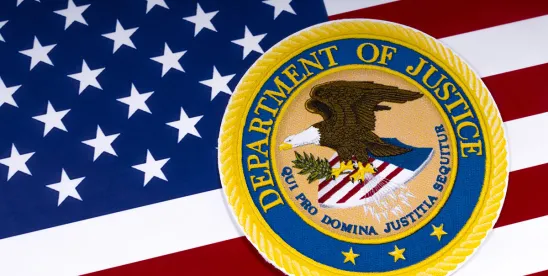DOJ recently announced white-collar crime enforcement priorities and significant changes to its corporate enforcement policies (here and here). “[O]verbroad and unchecked corporate and white-collar enforcement burdens U.S. businesses and harms U.S. interests,” and “[n]ot all corporate misconduct warrants federal criminal prosecution,” according to the memo. New changes to these DOJ policies are intended to help companies navigate what to expect when making a disclosure and clarify the additional benefits that are available to companies that self-disclose and cooperate.
Priority Enforcement Areas
DOJ’s Criminal Division will prioritize investigating and prosecuting white-collar crimes in certain identified high-impact areas, as summarized below:
- Health care and federal program and procurement fraud;
- Trade and customs fraud, including tariff evasion;
- Fraud perpetrated through variable interest entities, including securities fraud, and other market manipulation schemes;
- Market manipulation including, Ponzi schemes, investment fraud, elder and servicemember fraud, and health and safety consumer fraud;
- National security threats to the U.S. financial system by financial institutions and their insiders that commit sanctions violations;
- Material support by corporations to foreign terrorist organizations, including recently designated cartels;
- Complex money laundering, including Chinese Money Laundering Organizations, and other organizations involved in laundering funds used in the manufacturing of illegal drugs;
- Controlled Substances Act and the Federal Food, Drug, and Cosmetic Act violations, including counterfeit fentanyl pills and unlawful distribution of opioids by medical professionals and companies;
- Bribery and associated money laundering that impact U.S. national interests, undermine U.S. national security, harm the competitiveness of U.S. businesses, and enrich foreign corrupt officials; and
- Crimes involving digital assets that victimize investors and consumers; that use digital assets in furtherance of other criminal conduct; and willful violations that facilitate significant criminal activity.
DOJ has also called for an increased investigative pace and directed prosecutors to “move expeditiously to investigate cases and make charging decisions” quickly to ensure “that [investigations] do not linger and are swiftly concluded.”
Corporate Enforcement Policy Changes
New changes to the Corporate Enforcement and Voluntary Self-Disclosure Policy (“CEP”) include the following:
- For companies that satisfy all required elements from voluntary self-disclosure, to full cooperation, to timely and appropriate remediation, as well as have no aggravating circumstances, the CEP will make clear there “is a clear path to declination.” This is a marked contrast to prior guidance that entitled companies to a “presumption” of a declination.
- Companies that are willing to satisfy the core criteria, but have aggravating circumstances that raise concerns for the company to voluntarily self-disclose, may still qualify for declination under the revised CEP. In these cases, the DOJ will consider “the severity of those aggravating circumstances and the company’s cooperation and remediation,” offering a potential outcome to avoid prosecution.
- The revised CEP also clarifies that companies may still qualify for meaningful benefits when self-disclosing in good faith – such as a non-prosecution agreement, a 75 percent reduction in criminal fines, and no requirement to appoint a monitor – even if the disclosure is not considered timely or comes after the DOJ, without the company’s awareness, has already discovered the misconduct.
DOJ also announced revisions to the Criminal Division’s standards and policy for the selection of monitors in matters handled by the Criminal Division.
Monitorships will be limited to those cases where deemed “necessary,” including “when a company cannot be expected to implement an effective compliance program or prevent recurrence of the underlying misconduct without such heavy-handed intervention.” Specifically, the monitor selection standards will be revised to clarify “the factors that prosecutors must consider when determining whether a monitor is appropriate and how those factors should be applied,” as well as require that monitorships be “narrowly tailor[ed]…to address the risk of recurrence of the underlying criminal conduct and to reduce unnecessary costs.” Such factors prosecutors may consider include: (1) “the nature and seriousness of the conduct” and the risk of recurrence; (2) other available regulatory oversight; (3) the effectiveness of the company’s compliance program at resolution; and (4) the maturity of the company’s internal controls, including the company’s ability to test its compliance program as well as make improvements.
DOJ’s corporate whistleblower program will also undergo an evaluation to identify “additional areas of focus” that align with the Administration’s key initiatives. “[P]rocurement and federal program fraud; trade, tariff, and customs fraud; violations of federal immigration law; and violations involving sanctions, material support of foreign terrorist organizations, or those that facilitate cartels and TCOs, including money laundering, narcotics, and Controlled Substances Act violations” have all been included as areas of interest.
Takeaways
- Voluntary Self-Disclosure now means “a clear path to declination” rather than a “presumption” of a declination.
- Look for an uptick in False Claims Act investigations in the international trade area including, customs fraud and tariff evasion.
- DOJ is requiring for prosecutors to “move expeditiously to investigate cases,” and will be actively monitoring investigation timelines and progress to ensure prompt resolution. This means that stakeholders and outside counsel will need to conduct internal investigations and make decisions quicker.
- Notwithstanding the 180-day FCPA pause, bribery that enriches foreign officials and undermines U.S. business remains a priority.
- Monitorships appear to now be the exception, not the rule for corporate resolutions.
- Deferred Prosecution Agreements may be back given that DOJ is making clear “[n]ot all corporate misconduct warrants federal criminal prosecution.” Rather, DOJ is directing Criminal Division prosecutors to weigh “additional factors,” such as whether a company self-disclosed and fully cooperated, as well as its remediation efforts, when assessing whether to prosecute.
Companies will want to stay ahead of these developments and revised corporate enforcement policies. As we have reported, well-designed compliance programs help to mitigate not only bribery and corruption risks, but also money laundering, sanctions issues, human rights violations, and financial fraud risks. Effective and adequately resourced compliance programs also help to foster positive speak-up cultures, ensuring that employees feel comfortable to report suspected misconduct via available internal channels and reporting mechanisms. Maintaining robust internal controls make companies better equipped and prepared to flag potential misconduct early as well as navigate difficult considerations around self-disclosure. Companies should continue to evaluate their compliance programs, including the effectiveness and efficiency of their internal reporting mechanisms and internal investigations processes.





 />i
/>i
